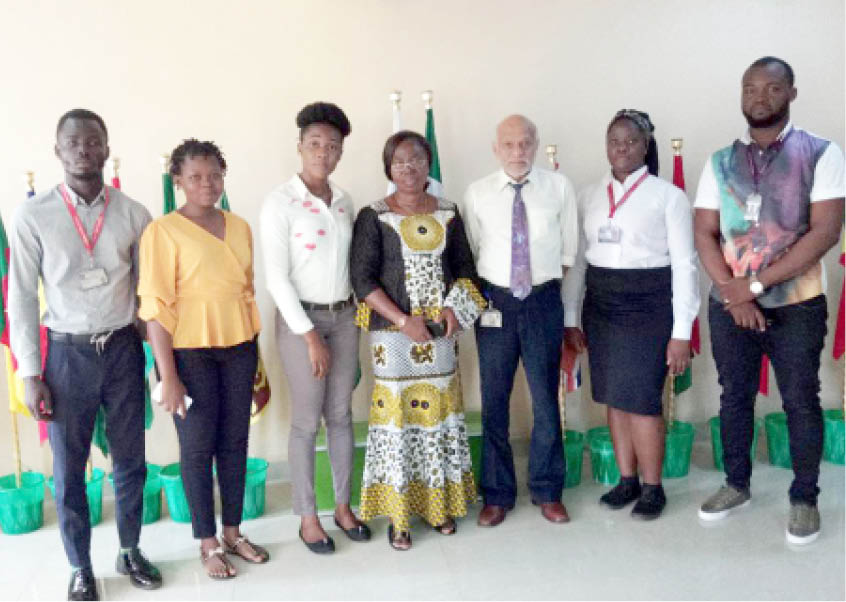Unilorin’s international students recount experiences
A number of admission slots are taken up by foreign students in the University of Ilorin, said to be one of the leading destinations for international students in Nigeria. The situation has motivated the authorities to obtain accurate student information, perhaps, to offer required support. The university is said to be among those with the highest […]

Professor Williams (centre) with some staff and students
A number of admission slots are taken up by foreign students in the University of Ilorin, said to be one of the leading destinations for international students in Nigeria. The situation has motivated the authorities to obtain accurate student information, perhaps, to offer required support.
The university is said to be among those with the highest international student population; second only to few others, like Ahmadu Bello University, Zaria (ABU) which, with a total of 37 students from different countries in the 2018 admission exercise, was adjudged the institution with the highest number of admission of foreign students by the Joint Admissions and Matriculation Board (JAMB).
Unilorin’s Centre for International Education was established in 2009 and since then it has been receiving international students, both for undergraduate and graduate studies, its director, Professor Olabisi Olabode Williams, has said.
The centre has the responsibility of initiating, encouraging, promoting, facilitating and coordinating international programmes and linkages, faculty and student exchanges and mobility, collaborative research projects across academic disciplines and global network.
“We have well over 300 foreign students studying at Unilorin which started with only 70 students. We have postgraduate students spread across various faculties and programmes, more than 200 of them have been graduates. As at the last count, we have graduated 52 higher degree students,” she said.
The director said the university has specific requirements for the admission of international students in which non-English students would go through orientation programme including learning English Language for a year.
According to Williams, “many of our students are from Francophone countries that come through ‘Immersion programme’. Apart from this centre, there is a Linguistic Immersion Centre that helps international students to learn English Language.”
The director explained that though overseas students pay slightly higher than locals, the rate is cheaper compared to what foreign universities charge.
Unilorin, the director said, has 62 Cameroonian students being the highest in population followed by 58 students from Benin Republic and those from other parts of Africa as well as Asian countries. The centre also has 13 foreign lecturers.
Most international students face accommodation problem because they, by and large, arrive late; besides, they have to live together with locals for acculturation, she added.
“Apart from the education they receive, they also have to go through the process of acculturation and it cannot occur when they are in ‘standalone’ hostel. They have to mix with other students and that is where the challenge is because hostel accommodation is on first-come, first-serve basis; sometimes they do not respond in good time,” she said.
In the meantime, the president of International Students Association, Konneh Ishmeal A., a Liberian studying Political Science, said he has been in Unilorin since 2015 and described his experience as attention-grabbing.
“I have come to realize that assimilating to a new culture is useful. The institution has tried to educate students across Africa and other continents and the level of care and hospitality is appreciative,” he said.
Also, the secretary of the association, Christiana Peter, a Law student from Liberia, expressed happiness for the opportunity she got to study in a Nigeria.
According to her, “Unilorin opens international students to different opportunities. It creates avenue to interact and we are not limited because we are allowed to participate in every activity on campus, as far as contesting for students’ union posts. One major impact is the opportunity to interact with different cultures and beliefs, traditions and customs.”
A 300 level law student from Benin Republic, Mustapha’s O. Abeeb said, “I come from a very small country and with my experience at Unilorin in the last few years; I can say Nigeria is attractive.”
Bimpere Davidine, a graduate student from Burkina Faso who completed his undergraduate studies in Unilorin, said initially he encountered challenges due to communication.
“At first I had problems because I came from a Francophone country through the Immersion programme. It was a bit difficult for me to communicate.
“I tried to mingle with Nigerian students and not to be left alone. Despite all the initial hiccups, I will recommend Unilorin to people in my country and I have even brought three other students. I was the first student from Burkina Faso,” she said.
